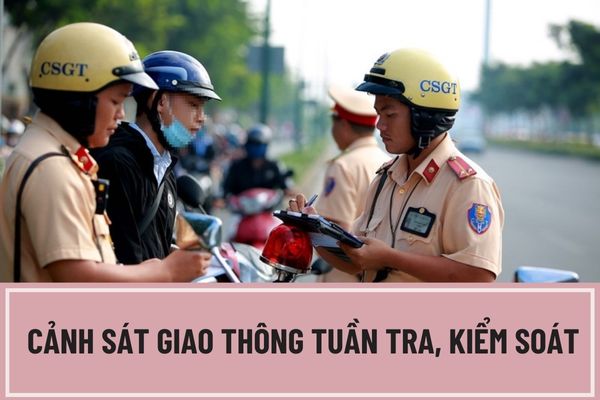Duties of Traffic Police in Patrol and Control as Regulated. Form of Patrol and Control as Regulated.
Duties of Traffic Police During Patrol and Control as Regulated
The duties of Traffic Police during patrol and control according to Article 7 of Circular 65/2020/TT-BCA are as follows:
- Execute the orders and plans for patrol, control, and violation handling as approved by competent authorities.
- Patrol and control to ensure order and road traffic safety within the assigned routes and areas.
- Promptly detect, prevent, and strictly handle violations of road traffic order and safety and other violations as regulated by law; cooperate with road management authorities to detect and prevent violations of regulations on road infrastructure protection and road safety corridors.
- Investigate and resolve traffic accidents as regulated by law and by the Ministry of Public Security.
- Proactively or in cooperation with units inside and outside the People's Police force to prevent and combat crimes and other law violations on road traffic routes and means of road traffic;
Participate in anti-terrorism, anti-riot, disease prevention, disaster response, firefighting, rescue, and resolving incidents on road traffic routes as regulated by law.
- Through patrol, control, and violation handling, perform the following tasks:
+ Detect shortcomings in State management regarding security, order, and road traffic to report, propose to competent authorities, and recommend functional agencies to promptly rectify;
+ Guide, propagate, and encourage People to participate in ensuring road traffic order and safety and comply with road traffic laws.
- Perform other duties of the People's Public Security force as regulated by law.

Duties of Traffic Police During Patrol and Control as Regulated. Forms of patrol and control as regulated (Image from the Internet)
Authority of Traffic Police During Patrol and Control as Regulated
The authority of Traffic Police during patrol and control according to Article 8 of Circular 65/2020/TT-BCA are as follows:
- Authorized to stop road traffic vehicles (hereinafter referred to as "vehicles") as regulated. Control people and vehicles on the road, the documents of vehicle operators, vehicle documents, and personal documents of individuals on controlled vehicles as regulated by law; control the implementation of road transport activities as regulated by law.
- Authorized to apply measures to prevent and handle traffic violations, social order violations, and other violations as regulated by law.
- Authorized to request agencies, organizations, and individuals to cooperate and support in resolving accidents, traffic congestion, obstructions, or other incidents causing disorder and road traffic safety.
In urgent cases to protect national security, ensure social order and safety, or prevent harmful consequences occurring or at risk of occurring, Traffic Police on duty during patrol and control are authorized to mobilize means of transportation, communication means, other means of agencies, organizations, individuals, and the persons operating and using those means. This mobilization is executed directly or in writing.
- Authorized to equip, install, and use transportation means, professional technical equipment, weapons, and support tools as regulated by law and by the Ministry of Public Security.
- Authorized to temporarily suspend travel on certain road sections, re-route, re-define lanes and stopping/parking locations of vehicles in case of traffic congestion, traffic accidents, or other necessities for ensuring security, order, and social safety.
- Perform other authorities of the People's Public Security force as regulated by law.
Forms of Patrol and Control Conducted by Traffic Police
Based on Article 9 of Circular 65/2020/TT-BCA, Traffic Police conduct patrol and control in the following forms:
(1) Mobile Patrol and Control:
Traffic Police move within the assigned routes and areas by vehicle or on foot to conduct patrol and control according to the approved plans, directly supervise or use professional technical equipment to supervise, prevent, promptly detect, and strictly handle road traffic violations and other violations as regulated by law.
(2) Control at Traffic Police Stations or at a Point on the Road:
- Traffic Police organize forces at Traffic Police Stations or at a point on the road according to approved plans to:
Implement overall control of road vehicles; control and handle violations during peak patrol and control periods; control and handle violations by special subjects; control through professional technical equipment; cooperate with related units and agencies to prevent and combat crimes, ensure order, traffic safety, security, order, and social safety; perform other tasks as directed by competent authorities as regulated by law;
- Install and use professional technical equipment to monitor control areas at Traffic Police Stations. At a point on the road, choose locations with wide, clear road areas that do not obstruct vision and conform with the law. When controlling at night, there must be lighting to ensure sufficient visibility.
(3) Mobile Patrol and Control Combined with Control at a Point or at a Traffic Police Station: When mobile patrol and control combine with control at a point on the road or at a Traffic Police Station, or when controlling at a point on the road or at a Traffic Police Station combines with mobile patrol and control, it must be clearly stated in the patrol and control plan approved by competent authorities.
LawNet